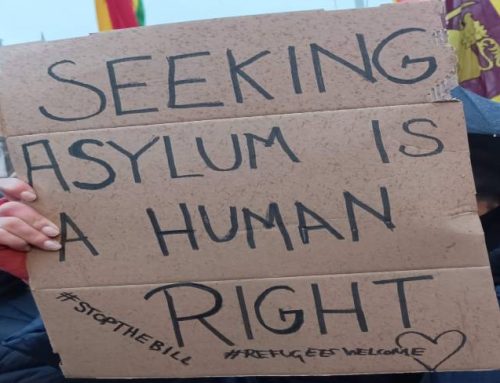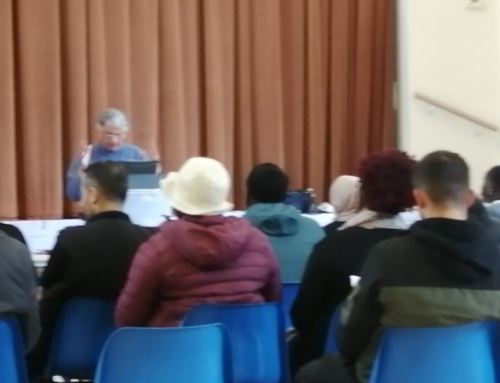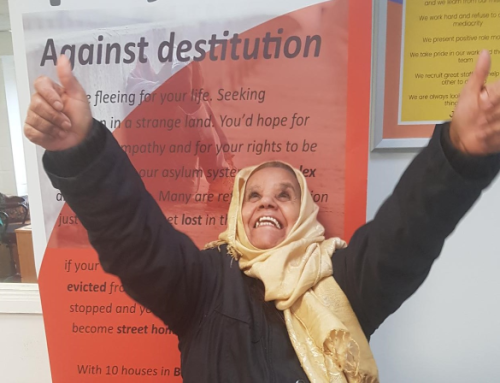This is a shortened version of a blog published here:
I’ve spent a few weeks looking at some numbers which tell an extraordinary story about the asylum system, and the ‘New Plan for Immigration’ on which the Home Office are currently consulting. They are so extraordinary that they make me raise at least 1 eyebrow. If I hadn’t got the figures direct from the Home Office via a freedom of information request I’d be suspicious. Surely not even the Home Office can disregard such striking statistics? And yet here we are.
In short the asylum system is making many people street homeless and destitute to force them to return home. After submitting fresh information they turn out to have a well founded fear of persecution and are granted leave to remain in the UK. And the response to this in ‘A New Plan for Immigration’, rather than (say) not making them street homeless, is to try to stop them from submitting the new information on which their lives may depend.
For a while I’ve been trying to find out how many people get fully refused asylum – That is to say that they have had an initial asylum decision and then an appeal refused – but have then gone on to provide additional evidence and on the basis of that have been granted refugee status or some other form of protection. This matters because once fully refused a single adult without dependent children is left street homeless and destitute to force them to return ‘home’. They have no housing, no benefits and no right to work. These are the people that Hope Projects and other NACCOM members support. So how many people does this happen to? You can’t pull these numbers out of the Home Office asylum statistics so instead I used a freedom of information request.
“How many people have been granted asylum or some other form of leave to remain having had an asylum appeal refused and then making further submissions.” (FOI 61836)
I had a suspicion that there were probably hundreds of cases each year. That would be shocking but if it was true then 2 things follow:
Firstly that the right to further submissions is a vital part of the asylum protection system and is a mechanism that has saved many people from being wrongly returned to face persecution or the denial of human rights.
Secondly that it is recklessly dangerous to leave people homeless and destitute following the refusal of an asylum appeal in order to force them to return. That is literally starving people to force them to return home when we know that there is a reasonable chance that they will face persecution if they go. That would be deliberately working against the fundamental principle of asylum.
So this week after quite a lengthy process I got my response. If the figures they have provided are accurate – and I have no reason to believe otherwise – then it turns out I was wrong. There are not hundreds of cases. There are thousands. Over 14,000 people since the start of 2015. 3942 people in 2019 alone – the last full year for which numbers are available
So what can we conclude?
Firstly, and maybe counterintuitively, I think this says something positive about the asylum system. The nature of asylum is such that traumatised people are not realistically going to tell perfectly coherent stories backed up with meticulous documentation first off. It recognises that people who have been raped, or tortured, or persecuted on the basis of their sexuality may not go into detail when, frightened and traumatised, they first get interviewed by an immigration officer. Further representations allow for humane and robust decisions to come out of the messiness of real human experience.
Secondly, it says something profoundly negative about the asylum support system. When your asylum appeal is refused, unless you have dependent children, then you are evicted from your accommodation and your financial support stops. You are left street homeless and destitute with no right to work or to rent. You hit the hostile environment at its most raw. This is done to ensure that you return home. And yet we now know that thousands of people in this situation do have well founded fears of persecution and will eventually have this recognised through further submissions. Destitution as a tool of policy is never morally right. In this context it’s utterly abhorrent.
Finally, back to the consultation on ‘A New Plan for Immmigration’.
On page 27 we find:
“The number of further submissions applications made by people who are ‘Appeal Rights Exhausted’ (ARE), which means they have no further grounds on which to appeal their original decision, remains high. Whilst further submissions may be based on changes of circumstances since the original claim or appeal, this is not always the case. We want to ensure that people are able to bring all relevant evidence upfront and reduce the ability for claimants to draw out the process by introducing new elements to their claims and launching appeals, meaning they are kept within the system for extended periods of time.”
Further submissions are not “the ability for claimants to draw out the process by introducing new elements to their claims”. They are a fundamental building block of a humane asylum system that have saved thousands of people from persecution and even death. You can tell the Home Office this here: https://www.gov.uk/government/consultations/new-plan-for-immigration
Picture by James Burke, https://www.flickr.com/photos/deburca/7195447168
https://creativecommons.org/licenses/by/2.0/
















Leave A Comment
You must be logged in to post a comment.